Early Childhood Education: Educator's Philosophy and Practice
VerifiedAdded on 2023/02/01
|10
|2258
|91
Essay
AI Summary
This essay delves into the significance of philosophy in early childhood education (ECE), exploring its impact on educators, children, and families. It defines philosophy as a guiding system shaping practices and policies within ECE, referencing the Early Years Learning Framework (EYLF) and National Quality Standard. The essay emphasizes the importance of play-based learning, highlighting how it fosters creativity and development. It discusses the educator's role in shaping children's values and motivations, emphasizing pedagogical and content knowledge, and the need for inclusive environments. The essay also underscores the value of family and community involvement, advocating for collaborative relationships to support children's learning. It concludes by stressing the importance of documentation, planning, assessment, and continuous reflection for educators to enhance the quality of ECE and promote sustainable practices.
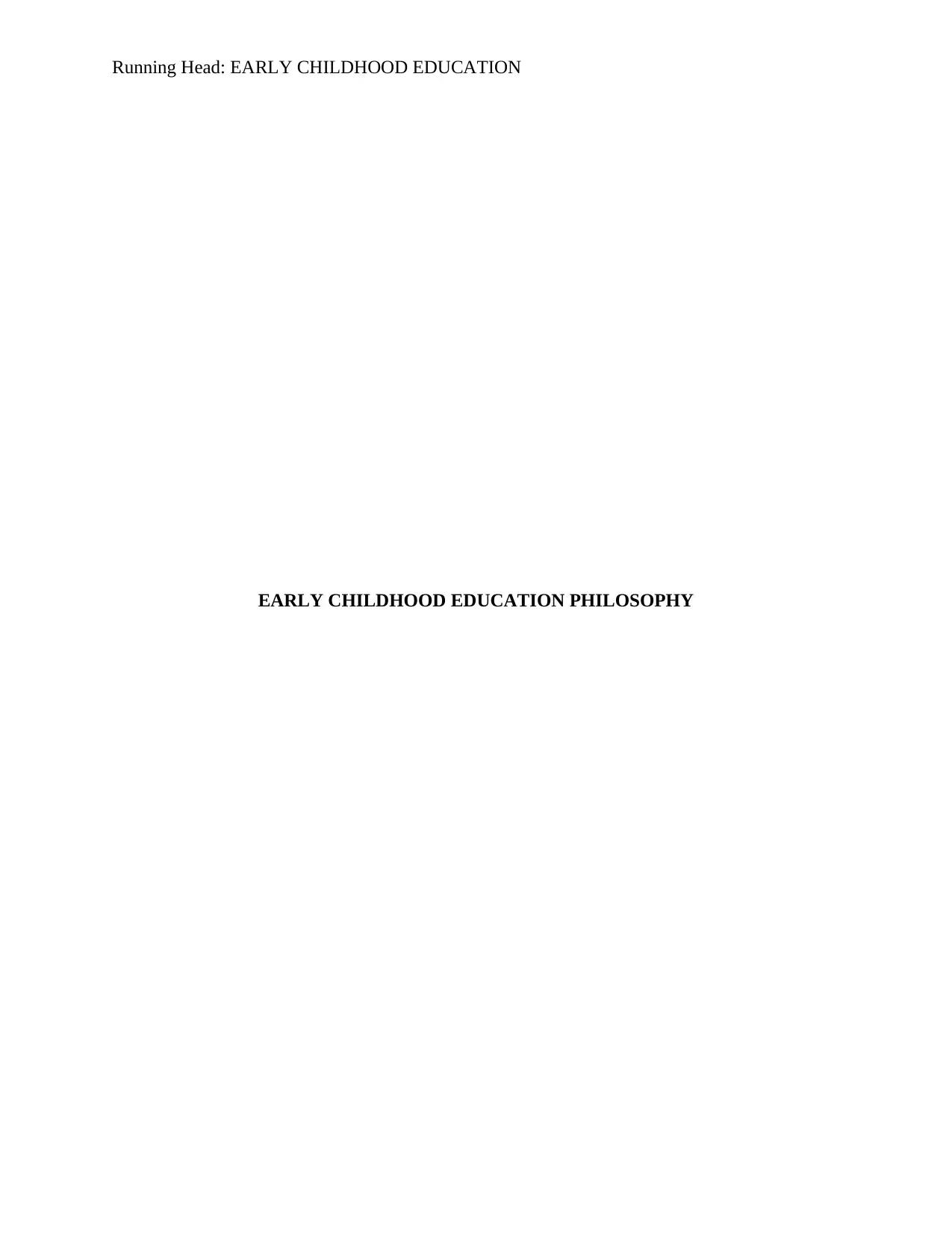
Running Head: EARLY CHILDHOOD EDUCATION
EARLY CHILDHOOD EDUCATION PHILOSOPHY
EARLY CHILDHOOD EDUCATION PHILOSOPHY
Paraphrase This Document
Need a fresh take? Get an instant paraphrase of this document with our AI Paraphraser
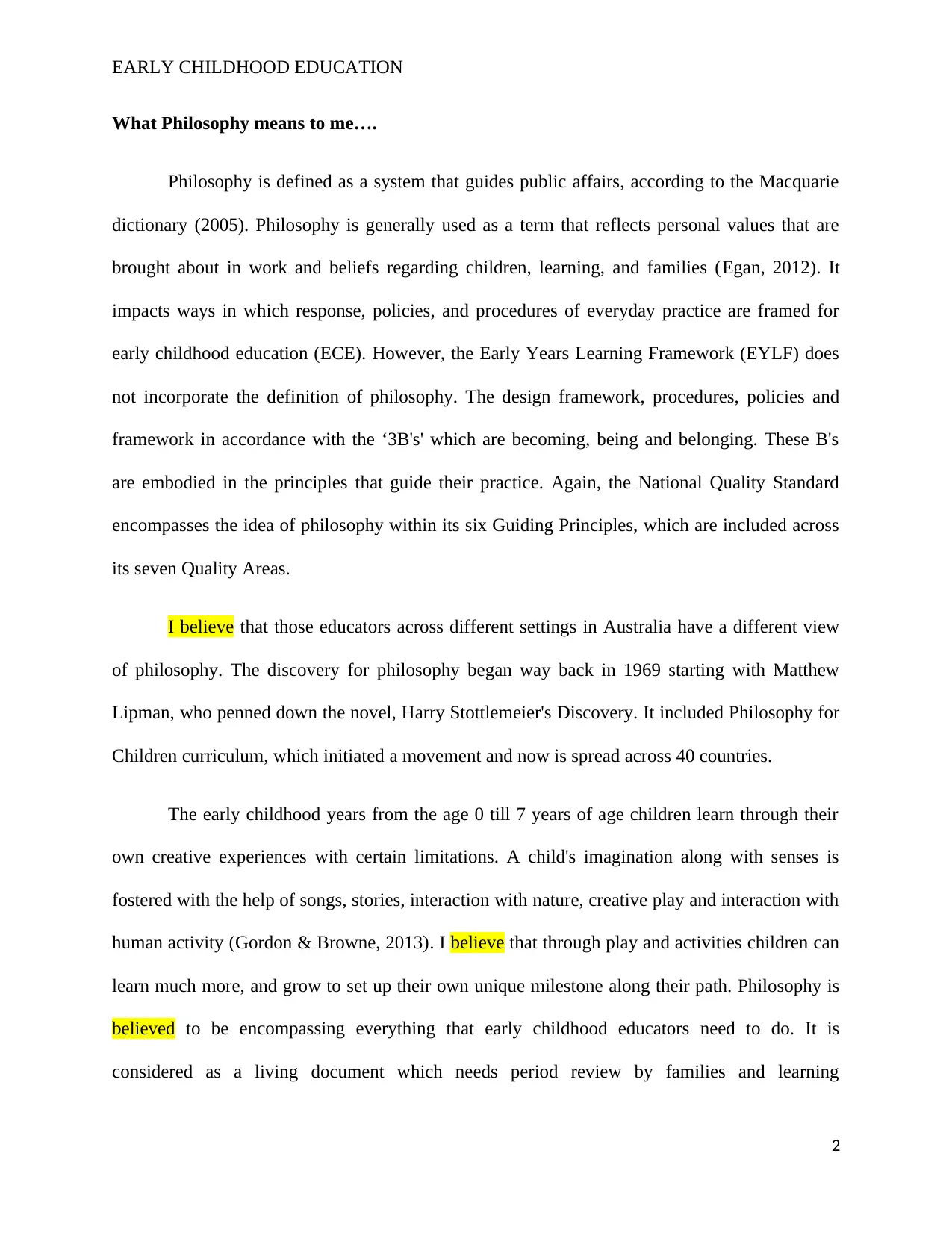
EARLY CHILDHOOD EDUCATION
What Philosophy means to me….
Philosophy is defined as a system that guides public affairs, according to the Macquarie
dictionary (2005). Philosophy is generally used as a term that reflects personal values that are
brought about in work and beliefs regarding children, learning, and families (Egan, 2012). It
impacts ways in which response, policies, and procedures of everyday practice are framed for
early childhood education (ECE). However, the Early Years Learning Framework (EYLF) does
not incorporate the definition of philosophy. The design framework, procedures, policies and
framework in accordance with the ‘3B's' which are becoming, being and belonging. These B's
are embodied in the principles that guide their practice. Again, the National Quality Standard
encompasses the idea of philosophy within its six Guiding Principles, which are included across
its seven Quality Areas.
I believe that those educators across different settings in Australia have a different view
of philosophy. The discovery for philosophy began way back in 1969 starting with Matthew
Lipman, who penned down the novel, Harry Stottlemeier's Discovery. It included Philosophy for
Children curriculum, which initiated a movement and now is spread across 40 countries.
The early childhood years from the age 0 till 7 years of age children learn through their
own creative experiences with certain limitations. A child's imagination along with senses is
fostered with the help of songs, stories, interaction with nature, creative play and interaction with
human activity (Gordon & Browne, 2013). I believe that through play and activities children can
learn much more, and grow to set up their own unique milestone along their path. Philosophy is
believed to be encompassing everything that early childhood educators need to do. It is
considered as a living document which needs period review by families and learning
2
What Philosophy means to me….
Philosophy is defined as a system that guides public affairs, according to the Macquarie
dictionary (2005). Philosophy is generally used as a term that reflects personal values that are
brought about in work and beliefs regarding children, learning, and families (Egan, 2012). It
impacts ways in which response, policies, and procedures of everyday practice are framed for
early childhood education (ECE). However, the Early Years Learning Framework (EYLF) does
not incorporate the definition of philosophy. The design framework, procedures, policies and
framework in accordance with the ‘3B's' which are becoming, being and belonging. These B's
are embodied in the principles that guide their practice. Again, the National Quality Standard
encompasses the idea of philosophy within its six Guiding Principles, which are included across
its seven Quality Areas.
I believe that those educators across different settings in Australia have a different view
of philosophy. The discovery for philosophy began way back in 1969 starting with Matthew
Lipman, who penned down the novel, Harry Stottlemeier's Discovery. It included Philosophy for
Children curriculum, which initiated a movement and now is spread across 40 countries.
The early childhood years from the age 0 till 7 years of age children learn through their
own creative experiences with certain limitations. A child's imagination along with senses is
fostered with the help of songs, stories, interaction with nature, creative play and interaction with
human activity (Gordon & Browne, 2013). I believe that through play and activities children can
learn much more, and grow to set up their own unique milestone along their path. Philosophy is
believed to be encompassing everything that early childhood educators need to do. It is
considered as a living document which needs period review by families and learning
2
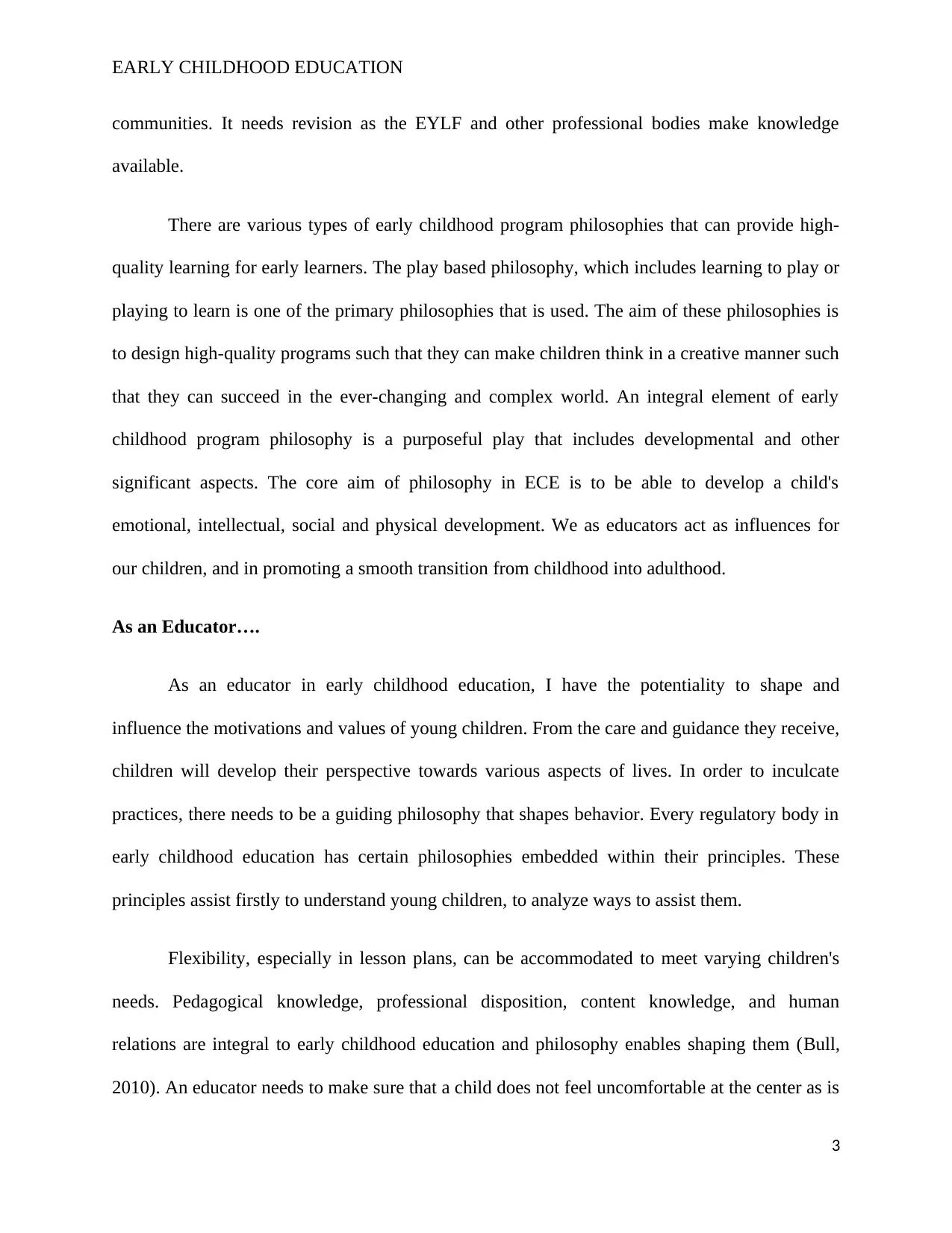
EARLY CHILDHOOD EDUCATION
communities. It needs revision as the EYLF and other professional bodies make knowledge
available.
There are various types of early childhood program philosophies that can provide high-
quality learning for early learners. The play based philosophy, which includes learning to play or
playing to learn is one of the primary philosophies that is used. The aim of these philosophies is
to design high-quality programs such that they can make children think in a creative manner such
that they can succeed in the ever-changing and complex world. An integral element of early
childhood program philosophy is a purposeful play that includes developmental and other
significant aspects. The core aim of philosophy in ECE is to be able to develop a child's
emotional, intellectual, social and physical development. We as educators act as influences for
our children, and in promoting a smooth transition from childhood into adulthood.
As an Educator….
As an educator in early childhood education, I have the potentiality to shape and
influence the motivations and values of young children. From the care and guidance they receive,
children will develop their perspective towards various aspects of lives. In order to inculcate
practices, there needs to be a guiding philosophy that shapes behavior. Every regulatory body in
early childhood education has certain philosophies embedded within their principles. These
principles assist firstly to understand young children, to analyze ways to assist them.
Flexibility, especially in lesson plans, can be accommodated to meet varying children's
needs. Pedagogical knowledge, professional disposition, content knowledge, and human
relations are integral to early childhood education and philosophy enables shaping them (Bull,
2010). An educator needs to make sure that a child does not feel uncomfortable at the center as is
3
communities. It needs revision as the EYLF and other professional bodies make knowledge
available.
There are various types of early childhood program philosophies that can provide high-
quality learning for early learners. The play based philosophy, which includes learning to play or
playing to learn is one of the primary philosophies that is used. The aim of these philosophies is
to design high-quality programs such that they can make children think in a creative manner such
that they can succeed in the ever-changing and complex world. An integral element of early
childhood program philosophy is a purposeful play that includes developmental and other
significant aspects. The core aim of philosophy in ECE is to be able to develop a child's
emotional, intellectual, social and physical development. We as educators act as influences for
our children, and in promoting a smooth transition from childhood into adulthood.
As an Educator….
As an educator in early childhood education, I have the potentiality to shape and
influence the motivations and values of young children. From the care and guidance they receive,
children will develop their perspective towards various aspects of lives. In order to inculcate
practices, there needs to be a guiding philosophy that shapes behavior. Every regulatory body in
early childhood education has certain philosophies embedded within their principles. These
principles assist firstly to understand young children, to analyze ways to assist them.
Flexibility, especially in lesson plans, can be accommodated to meet varying children's
needs. Pedagogical knowledge, professional disposition, content knowledge, and human
relations are integral to early childhood education and philosophy enables shaping them (Bull,
2010). An educator needs to make sure that a child does not feel uncomfortable at the center as is
3
⊘ This is a preview!⊘
Do you want full access?
Subscribe today to unlock all pages.

Trusted by 1+ million students worldwide
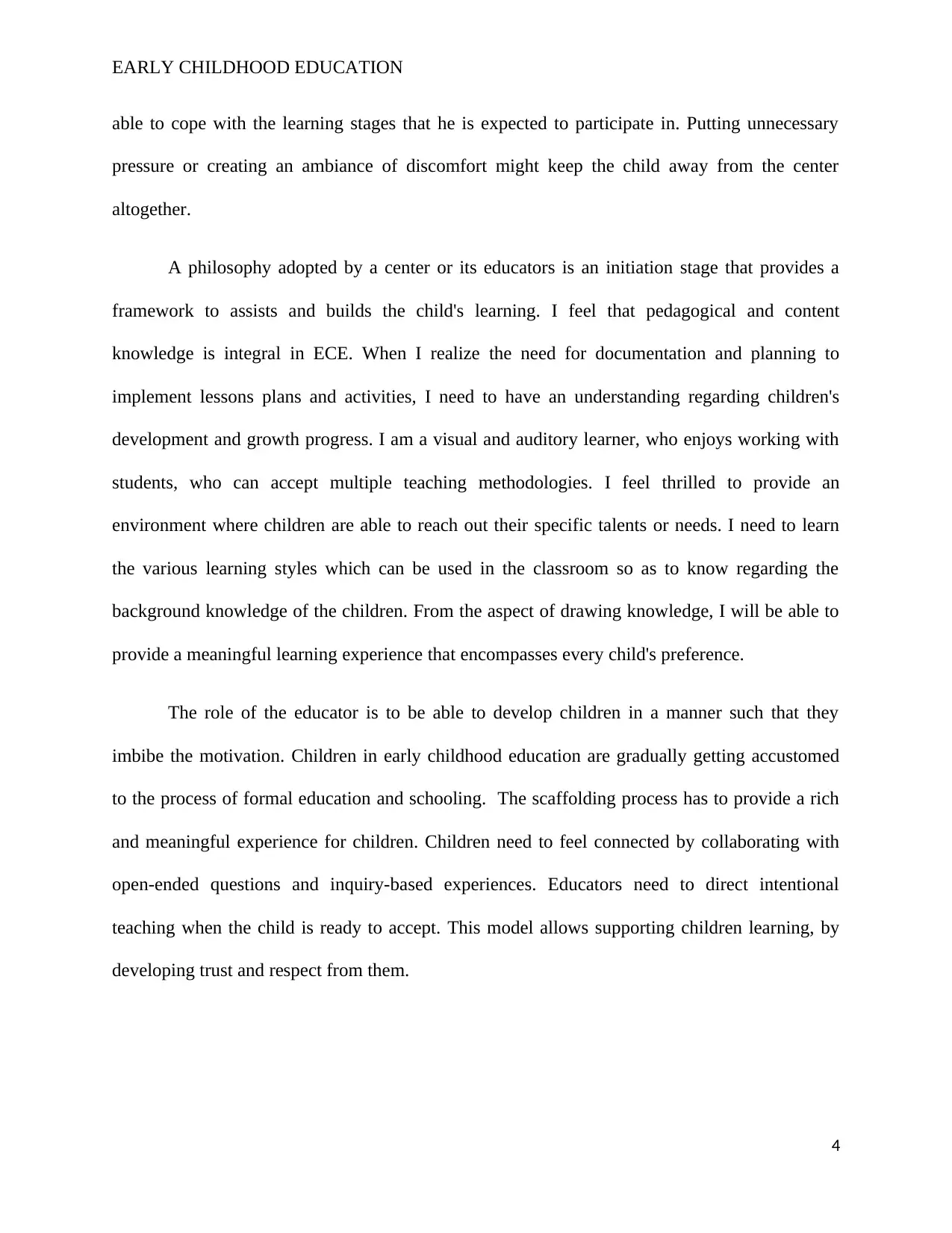
EARLY CHILDHOOD EDUCATION
able to cope with the learning stages that he is expected to participate in. Putting unnecessary
pressure or creating an ambiance of discomfort might keep the child away from the center
altogether.
A philosophy adopted by a center or its educators is an initiation stage that provides a
framework to assists and builds the child's learning. I feel that pedagogical and content
knowledge is integral in ECE. When I realize the need for documentation and planning to
implement lessons plans and activities, I need to have an understanding regarding children's
development and growth progress. I am a visual and auditory learner, who enjoys working with
students, who can accept multiple teaching methodologies. I feel thrilled to provide an
environment where children are able to reach out their specific talents or needs. I need to learn
the various learning styles which can be used in the classroom so as to know regarding the
background knowledge of the children. From the aspect of drawing knowledge, I will be able to
provide a meaningful learning experience that encompasses every child's preference.
The role of the educator is to be able to develop children in a manner such that they
imbibe the motivation. Children in early childhood education are gradually getting accustomed
to the process of formal education and schooling. The scaffolding process has to provide a rich
and meaningful experience for children. Children need to feel connected by collaborating with
open-ended questions and inquiry-based experiences. Educators need to direct intentional
teaching when the child is ready to accept. This model allows supporting children learning, by
developing trust and respect from them.
4
able to cope with the learning stages that he is expected to participate in. Putting unnecessary
pressure or creating an ambiance of discomfort might keep the child away from the center
altogether.
A philosophy adopted by a center or its educators is an initiation stage that provides a
framework to assists and builds the child's learning. I feel that pedagogical and content
knowledge is integral in ECE. When I realize the need for documentation and planning to
implement lessons plans and activities, I need to have an understanding regarding children's
development and growth progress. I am a visual and auditory learner, who enjoys working with
students, who can accept multiple teaching methodologies. I feel thrilled to provide an
environment where children are able to reach out their specific talents or needs. I need to learn
the various learning styles which can be used in the classroom so as to know regarding the
background knowledge of the children. From the aspect of drawing knowledge, I will be able to
provide a meaningful learning experience that encompasses every child's preference.
The role of the educator is to be able to develop children in a manner such that they
imbibe the motivation. Children in early childhood education are gradually getting accustomed
to the process of formal education and schooling. The scaffolding process has to provide a rich
and meaningful experience for children. Children need to feel connected by collaborating with
open-ended questions and inquiry-based experiences. Educators need to direct intentional
teaching when the child is ready to accept. This model allows supporting children learning, by
developing trust and respect from them.
4
Paraphrase This Document
Need a fresh take? Get an instant paraphrase of this document with our AI Paraphraser
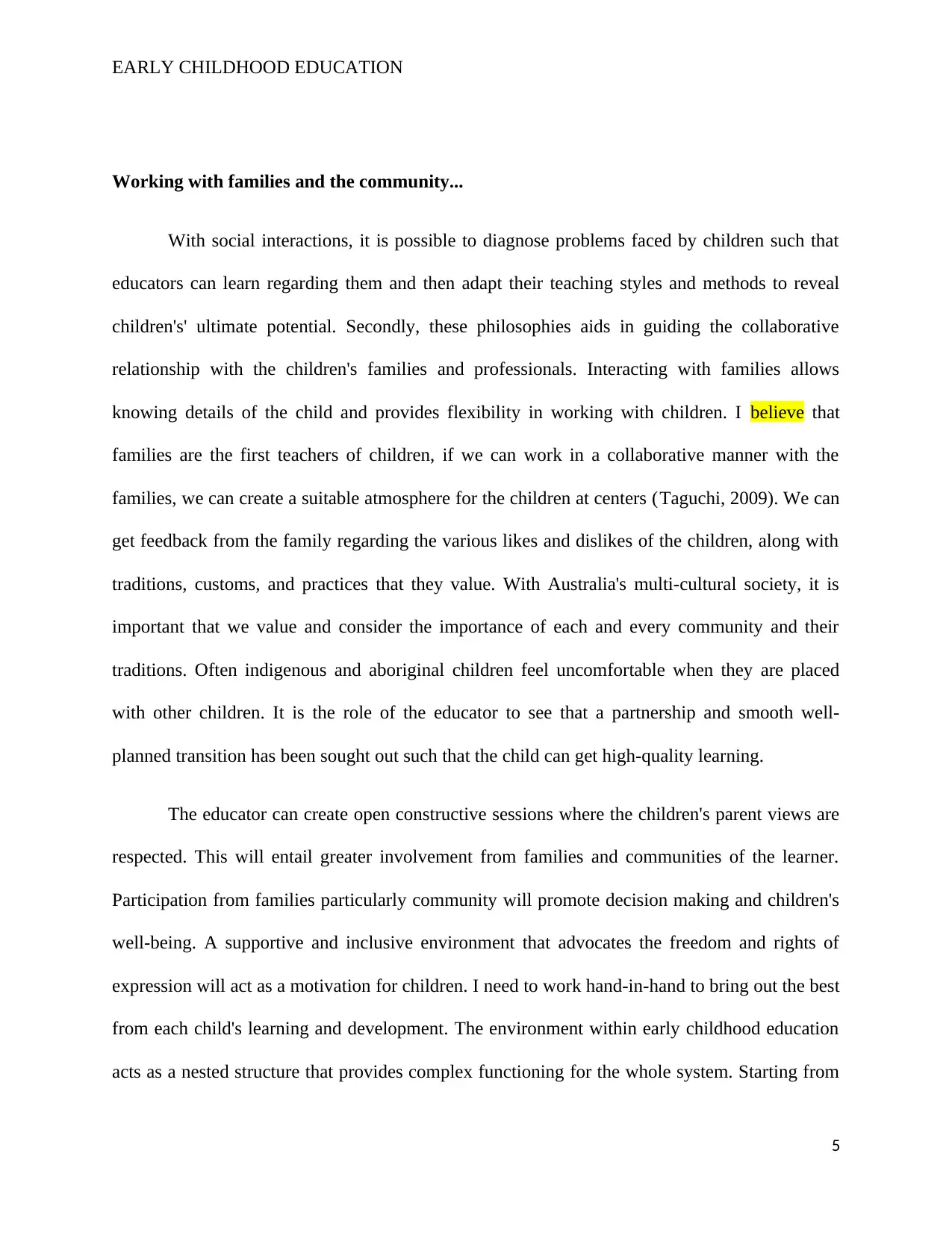
EARLY CHILDHOOD EDUCATION
Working with families and the community...
With social interactions, it is possible to diagnose problems faced by children such that
educators can learn regarding them and then adapt their teaching styles and methods to reveal
children's' ultimate potential. Secondly, these philosophies aids in guiding the collaborative
relationship with the children's families and professionals. Interacting with families allows
knowing details of the child and provides flexibility in working with children. I believe that
families are the first teachers of children, if we can work in a collaborative manner with the
families, we can create a suitable atmosphere for the children at centers (Taguchi, 2009). We can
get feedback from the family regarding the various likes and dislikes of the children, along with
traditions, customs, and practices that they value. With Australia's multi-cultural society, it is
important that we value and consider the importance of each and every community and their
traditions. Often indigenous and aboriginal children feel uncomfortable when they are placed
with other children. It is the role of the educator to see that a partnership and smooth well-
planned transition has been sought out such that the child can get high-quality learning.
The educator can create open constructive sessions where the children's parent views are
respected. This will entail greater involvement from families and communities of the learner.
Participation from families particularly community will promote decision making and children's
well-being. A supportive and inclusive environment that advocates the freedom and rights of
expression will act as a motivation for children. I need to work hand-in-hand to bring out the best
from each child's learning and development. The environment within early childhood education
acts as a nested structure that provides complex functioning for the whole system. Starting from
5
Working with families and the community...
With social interactions, it is possible to diagnose problems faced by children such that
educators can learn regarding them and then adapt their teaching styles and methods to reveal
children's' ultimate potential. Secondly, these philosophies aids in guiding the collaborative
relationship with the children's families and professionals. Interacting with families allows
knowing details of the child and provides flexibility in working with children. I believe that
families are the first teachers of children, if we can work in a collaborative manner with the
families, we can create a suitable atmosphere for the children at centers (Taguchi, 2009). We can
get feedback from the family regarding the various likes and dislikes of the children, along with
traditions, customs, and practices that they value. With Australia's multi-cultural society, it is
important that we value and consider the importance of each and every community and their
traditions. Often indigenous and aboriginal children feel uncomfortable when they are placed
with other children. It is the role of the educator to see that a partnership and smooth well-
planned transition has been sought out such that the child can get high-quality learning.
The educator can create open constructive sessions where the children's parent views are
respected. This will entail greater involvement from families and communities of the learner.
Participation from families particularly community will promote decision making and children's
well-being. A supportive and inclusive environment that advocates the freedom and rights of
expression will act as a motivation for children. I need to work hand-in-hand to bring out the best
from each child's learning and development. The environment within early childhood education
acts as a nested structure that provides complex functioning for the whole system. Starting from
5
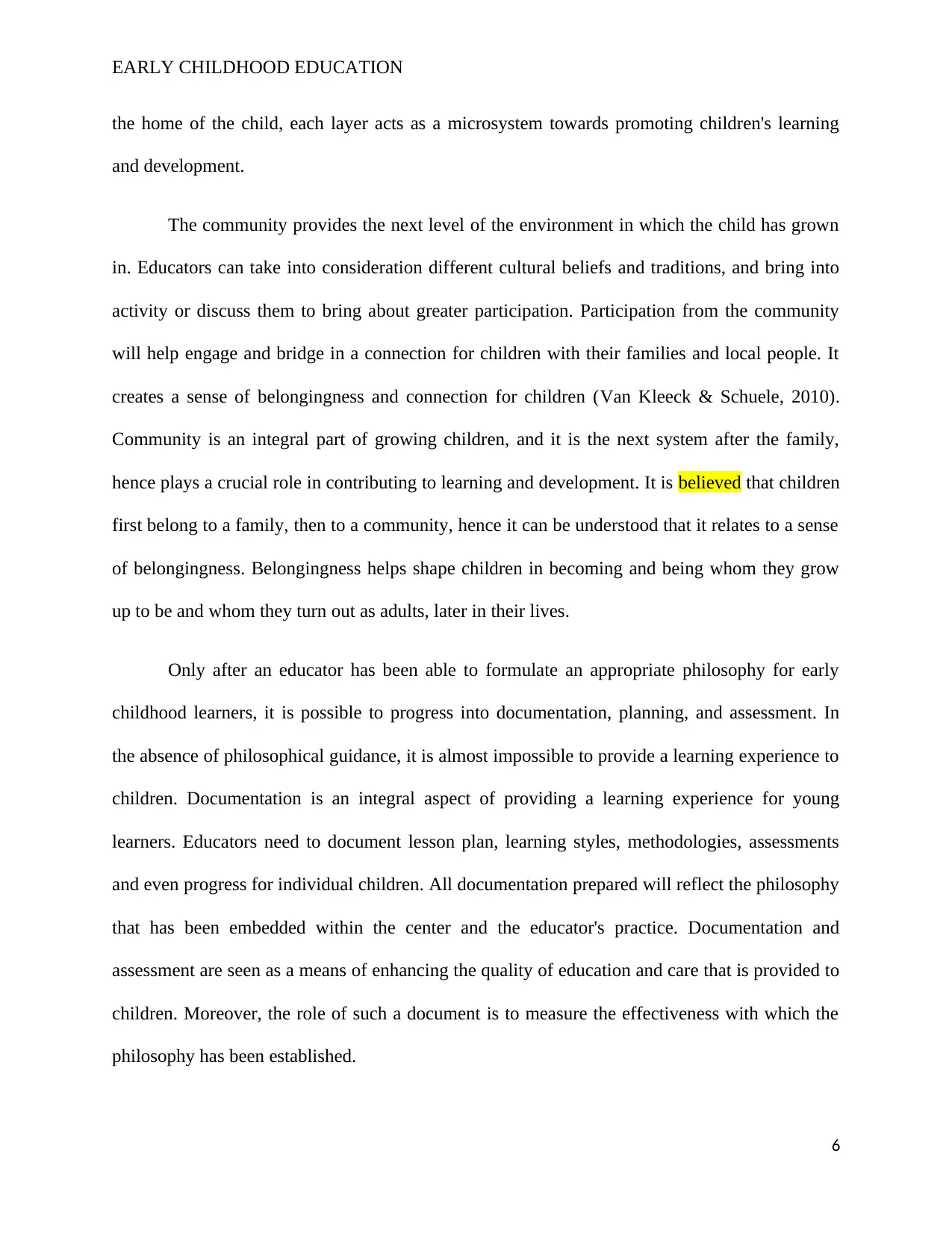
EARLY CHILDHOOD EDUCATION
the home of the child, each layer acts as a microsystem towards promoting children's learning
and development.
The community provides the next level of the environment in which the child has grown
in. Educators can take into consideration different cultural beliefs and traditions, and bring into
activity or discuss them to bring about greater participation. Participation from the community
will help engage and bridge in a connection for children with their families and local people. It
creates a sense of belongingness and connection for children (Van Kleeck & Schuele, 2010).
Community is an integral part of growing children, and it is the next system after the family,
hence plays a crucial role in contributing to learning and development. It is believed that children
first belong to a family, then to a community, hence it can be understood that it relates to a sense
of belongingness. Belongingness helps shape children in becoming and being whom they grow
up to be and whom they turn out as adults, later in their lives.
Only after an educator has been able to formulate an appropriate philosophy for early
childhood learners, it is possible to progress into documentation, planning, and assessment. In
the absence of philosophical guidance, it is almost impossible to provide a learning experience to
children. Documentation is an integral aspect of providing a learning experience for young
learners. Educators need to document lesson plan, learning styles, methodologies, assessments
and even progress for individual children. All documentation prepared will reflect the philosophy
that has been embedded within the center and the educator's practice. Documentation and
assessment are seen as a means of enhancing the quality of education and care that is provided to
children. Moreover, the role of such a document is to measure the effectiveness with which the
philosophy has been established.
6
the home of the child, each layer acts as a microsystem towards promoting children's learning
and development.
The community provides the next level of the environment in which the child has grown
in. Educators can take into consideration different cultural beliefs and traditions, and bring into
activity or discuss them to bring about greater participation. Participation from the community
will help engage and bridge in a connection for children with their families and local people. It
creates a sense of belongingness and connection for children (Van Kleeck & Schuele, 2010).
Community is an integral part of growing children, and it is the next system after the family,
hence plays a crucial role in contributing to learning and development. It is believed that children
first belong to a family, then to a community, hence it can be understood that it relates to a sense
of belongingness. Belongingness helps shape children in becoming and being whom they grow
up to be and whom they turn out as adults, later in their lives.
Only after an educator has been able to formulate an appropriate philosophy for early
childhood learners, it is possible to progress into documentation, planning, and assessment. In
the absence of philosophical guidance, it is almost impossible to provide a learning experience to
children. Documentation is an integral aspect of providing a learning experience for young
learners. Educators need to document lesson plan, learning styles, methodologies, assessments
and even progress for individual children. All documentation prepared will reflect the philosophy
that has been embedded within the center and the educator's practice. Documentation and
assessment are seen as a means of enhancing the quality of education and care that is provided to
children. Moreover, the role of such a document is to measure the effectiveness with which the
philosophy has been established.
6
⊘ This is a preview!⊘
Do you want full access?
Subscribe today to unlock all pages.

Trusted by 1+ million students worldwide
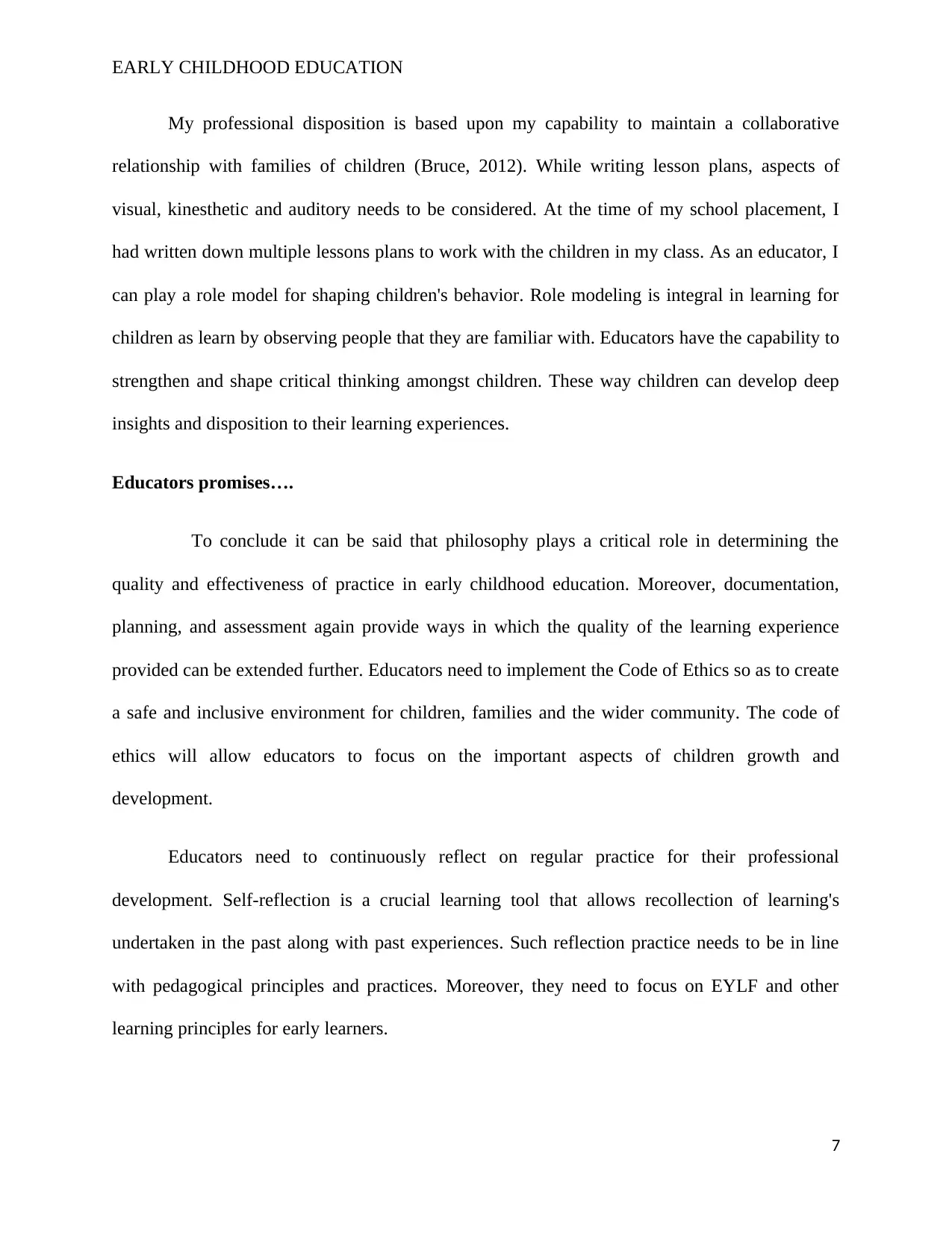
EARLY CHILDHOOD EDUCATION
My professional disposition is based upon my capability to maintain a collaborative
relationship with families of children (Bruce, 2012). While writing lesson plans, aspects of
visual, kinesthetic and auditory needs to be considered. At the time of my school placement, I
had written down multiple lessons plans to work with the children in my class. As an educator, I
can play a role model for shaping children's behavior. Role modeling is integral in learning for
children as learn by observing people that they are familiar with. Educators have the capability to
strengthen and shape critical thinking amongst children. These way children can develop deep
insights and disposition to their learning experiences.
Educators promises….
To conclude it can be said that philosophy plays a critical role in determining the
quality and effectiveness of practice in early childhood education. Moreover, documentation,
planning, and assessment again provide ways in which the quality of the learning experience
provided can be extended further. Educators need to implement the Code of Ethics so as to create
a safe and inclusive environment for children, families and the wider community. The code of
ethics will allow educators to focus on the important aspects of children growth and
development.
Educators need to continuously reflect on regular practice for their professional
development. Self-reflection is a crucial learning tool that allows recollection of learning's
undertaken in the past along with past experiences. Such reflection practice needs to be in line
with pedagogical principles and practices. Moreover, they need to focus on EYLF and other
learning principles for early learners.
7
My professional disposition is based upon my capability to maintain a collaborative
relationship with families of children (Bruce, 2012). While writing lesson plans, aspects of
visual, kinesthetic and auditory needs to be considered. At the time of my school placement, I
had written down multiple lessons plans to work with the children in my class. As an educator, I
can play a role model for shaping children's behavior. Role modeling is integral in learning for
children as learn by observing people that they are familiar with. Educators have the capability to
strengthen and shape critical thinking amongst children. These way children can develop deep
insights and disposition to their learning experiences.
Educators promises….
To conclude it can be said that philosophy plays a critical role in determining the
quality and effectiveness of practice in early childhood education. Moreover, documentation,
planning, and assessment again provide ways in which the quality of the learning experience
provided can be extended further. Educators need to implement the Code of Ethics so as to create
a safe and inclusive environment for children, families and the wider community. The code of
ethics will allow educators to focus on the important aspects of children growth and
development.
Educators need to continuously reflect on regular practice for their professional
development. Self-reflection is a crucial learning tool that allows recollection of learning's
undertaken in the past along with past experiences. Such reflection practice needs to be in line
with pedagogical principles and practices. Moreover, they need to focus on EYLF and other
learning principles for early learners.
7
Paraphrase This Document
Need a fresh take? Get an instant paraphrase of this document with our AI Paraphraser
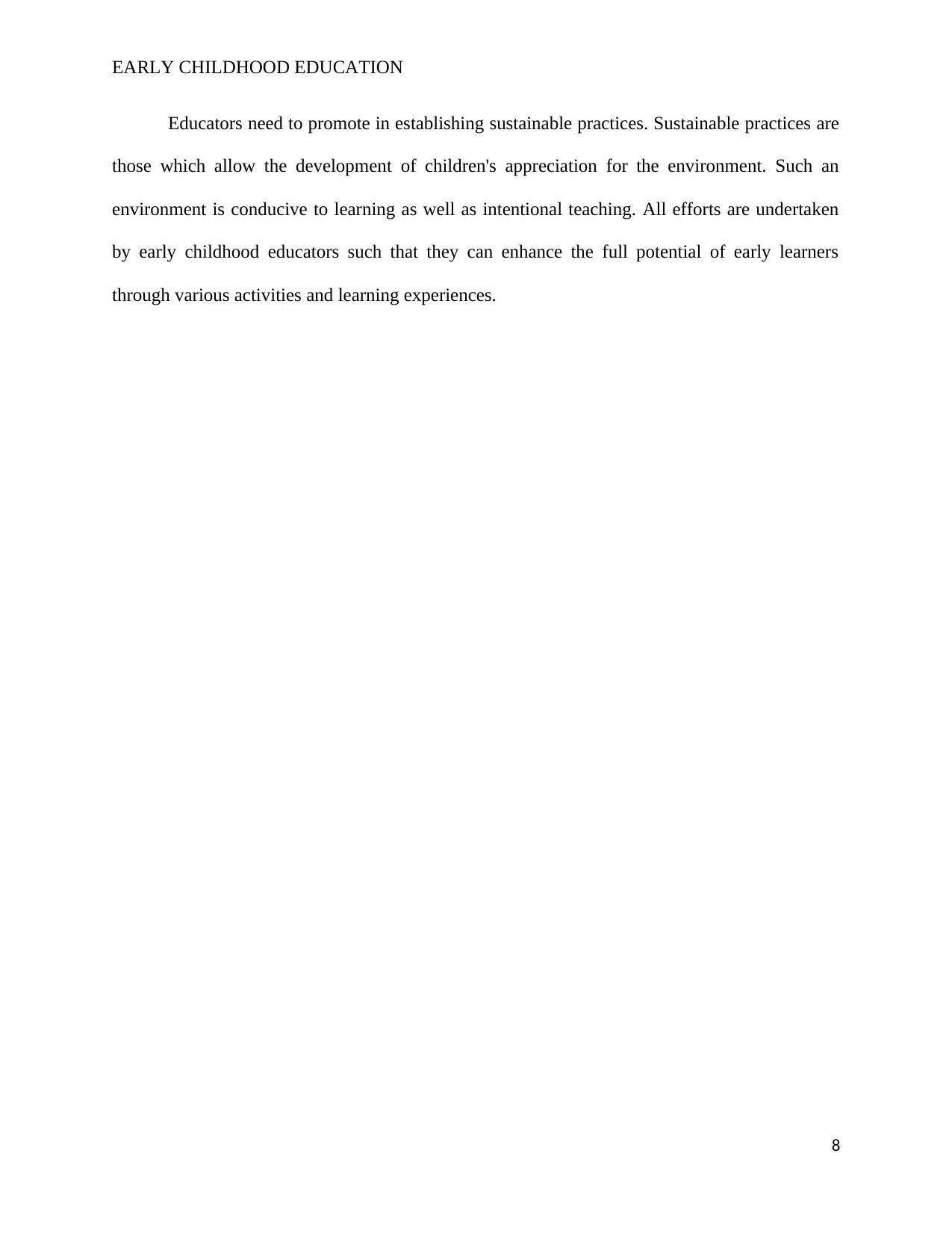
EARLY CHILDHOOD EDUCATION
Educators need to promote in establishing sustainable practices. Sustainable practices are
those which allow the development of children's appreciation for the environment. Such an
environment is conducive to learning as well as intentional teaching. All efforts are undertaken
by early childhood educators such that they can enhance the full potential of early learners
through various activities and learning experiences.
8
Educators need to promote in establishing sustainable practices. Sustainable practices are
those which allow the development of children's appreciation for the environment. Such an
environment is conducive to learning as well as intentional teaching. All efforts are undertaken
by early childhood educators such that they can enhance the full potential of early learners
through various activities and learning experiences.
8
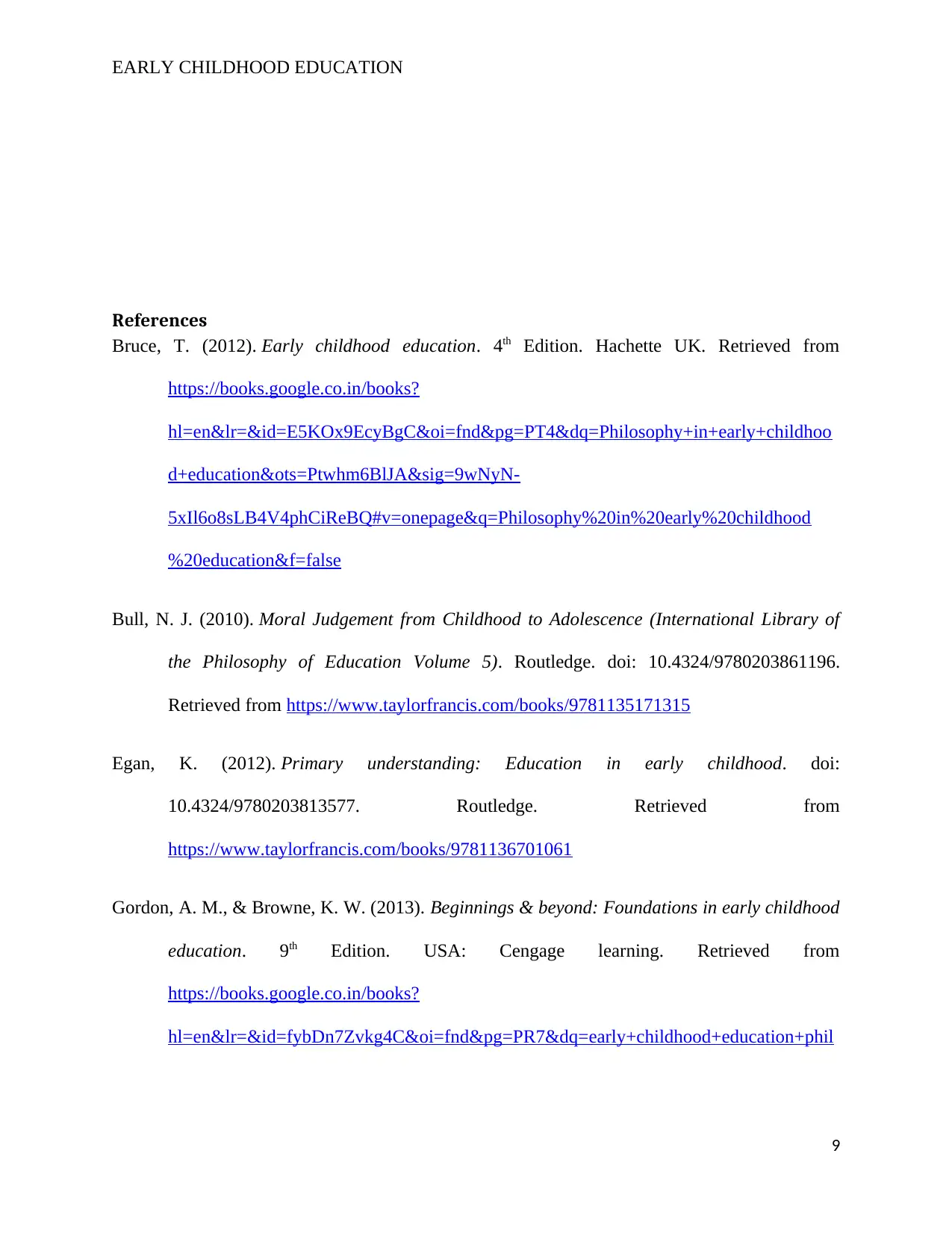
EARLY CHILDHOOD EDUCATION
References
Bruce, T. (2012). Early childhood education. 4th Edition. Hachette UK. Retrieved from
https://books.google.co.in/books?
hl=en&lr=&id=E5KOx9EcyBgC&oi=fnd&pg=PT4&dq=Philosophy+in+early+childhoo
d+education&ots=Ptwhm6BlJA&sig=9wNyN-
5xIl6o8sLB4V4phCiReBQ#v=onepage&q=Philosophy%20in%20early%20childhood
%20education&f=false
Bull, N. J. (2010). Moral Judgement from Childhood to Adolescence (International Library of
the Philosophy of Education Volume 5). Routledge. doi: 10.4324/9780203861196.
Retrieved from https://www.taylorfrancis.com/books/9781135171315
Egan, K. (2012). Primary understanding: Education in early childhood. doi:
10.4324/9780203813577. Routledge. Retrieved from
https://www.taylorfrancis.com/books/9781136701061
Gordon, A. M., & Browne, K. W. (2013). Beginnings & beyond: Foundations in early childhood
education. 9th Edition. USA: Cengage learning. Retrieved from
https://books.google.co.in/books?
hl=en&lr=&id=fybDn7Zvkg4C&oi=fnd&pg=PR7&dq=early+childhood+education+phil
9
References
Bruce, T. (2012). Early childhood education. 4th Edition. Hachette UK. Retrieved from
https://books.google.co.in/books?
hl=en&lr=&id=E5KOx9EcyBgC&oi=fnd&pg=PT4&dq=Philosophy+in+early+childhoo
d+education&ots=Ptwhm6BlJA&sig=9wNyN-
5xIl6o8sLB4V4phCiReBQ#v=onepage&q=Philosophy%20in%20early%20childhood
%20education&f=false
Bull, N. J. (2010). Moral Judgement from Childhood to Adolescence (International Library of
the Philosophy of Education Volume 5). Routledge. doi: 10.4324/9780203861196.
Retrieved from https://www.taylorfrancis.com/books/9781135171315
Egan, K. (2012). Primary understanding: Education in early childhood. doi:
10.4324/9780203813577. Routledge. Retrieved from
https://www.taylorfrancis.com/books/9781136701061
Gordon, A. M., & Browne, K. W. (2013). Beginnings & beyond: Foundations in early childhood
education. 9th Edition. USA: Cengage learning. Retrieved from
https://books.google.co.in/books?
hl=en&lr=&id=fybDn7Zvkg4C&oi=fnd&pg=PR7&dq=early+childhood+education+phil
9
⊘ This is a preview!⊘
Do you want full access?
Subscribe today to unlock all pages.

Trusted by 1+ million students worldwide
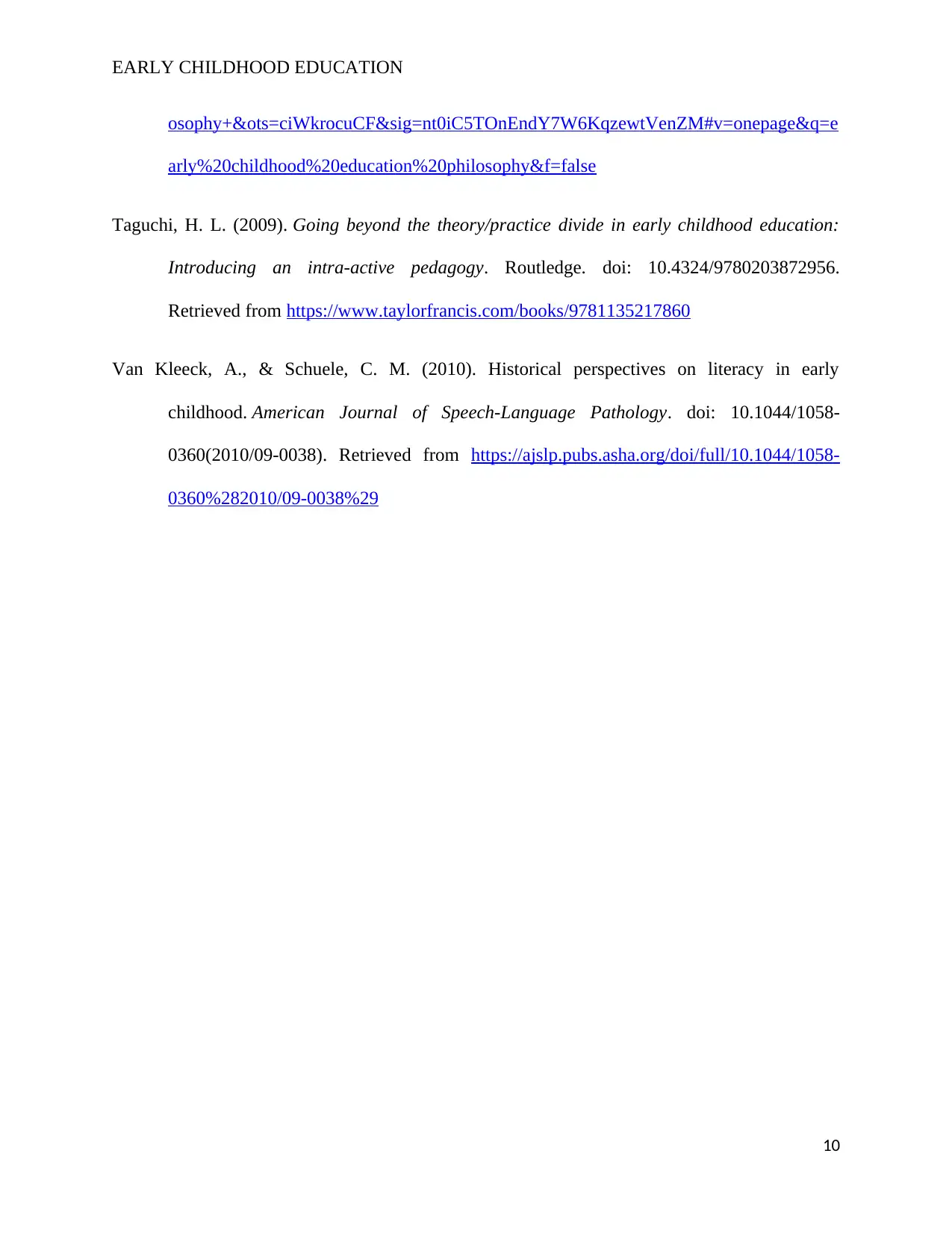
EARLY CHILDHOOD EDUCATION
osophy+&ots=ciWkrocuCF&sig=nt0iC5TOnEndY7W6KqzewtVenZM#v=onepage&q=e
arly%20childhood%20education%20philosophy&f=false
Taguchi, H. L. (2009). Going beyond the theory/practice divide in early childhood education:
Introducing an intra-active pedagogy. Routledge. doi: 10.4324/9780203872956.
Retrieved from https://www.taylorfrancis.com/books/9781135217860
Van Kleeck, A., & Schuele, C. M. (2010). Historical perspectives on literacy in early
childhood. American Journal of Speech-Language Pathology. doi: 10.1044/1058-
0360(2010/09-0038). Retrieved from https://ajslp.pubs.asha.org/doi/full/10.1044/1058-
0360%282010/09-0038%29
10
osophy+&ots=ciWkrocuCF&sig=nt0iC5TOnEndY7W6KqzewtVenZM#v=onepage&q=e
arly%20childhood%20education%20philosophy&f=false
Taguchi, H. L. (2009). Going beyond the theory/practice divide in early childhood education:
Introducing an intra-active pedagogy. Routledge. doi: 10.4324/9780203872956.
Retrieved from https://www.taylorfrancis.com/books/9781135217860
Van Kleeck, A., & Schuele, C. M. (2010). Historical perspectives on literacy in early
childhood. American Journal of Speech-Language Pathology. doi: 10.1044/1058-
0360(2010/09-0038). Retrieved from https://ajslp.pubs.asha.org/doi/full/10.1044/1058-
0360%282010/09-0038%29
10
1 out of 10
Related Documents
Your All-in-One AI-Powered Toolkit for Academic Success.
+13062052269
info@desklib.com
Available 24*7 on WhatsApp / Email
![[object Object]](/_next/static/media/star-bottom.7253800d.svg)
Unlock your academic potential
Copyright © 2020–2026 A2Z Services. All Rights Reserved. Developed and managed by ZUCOL.



